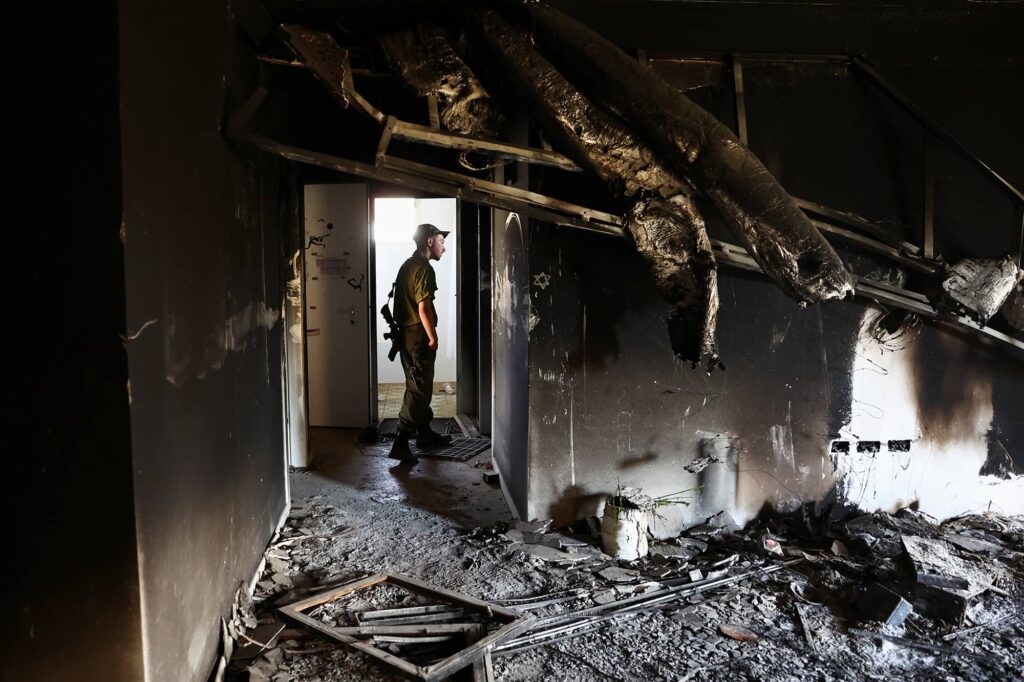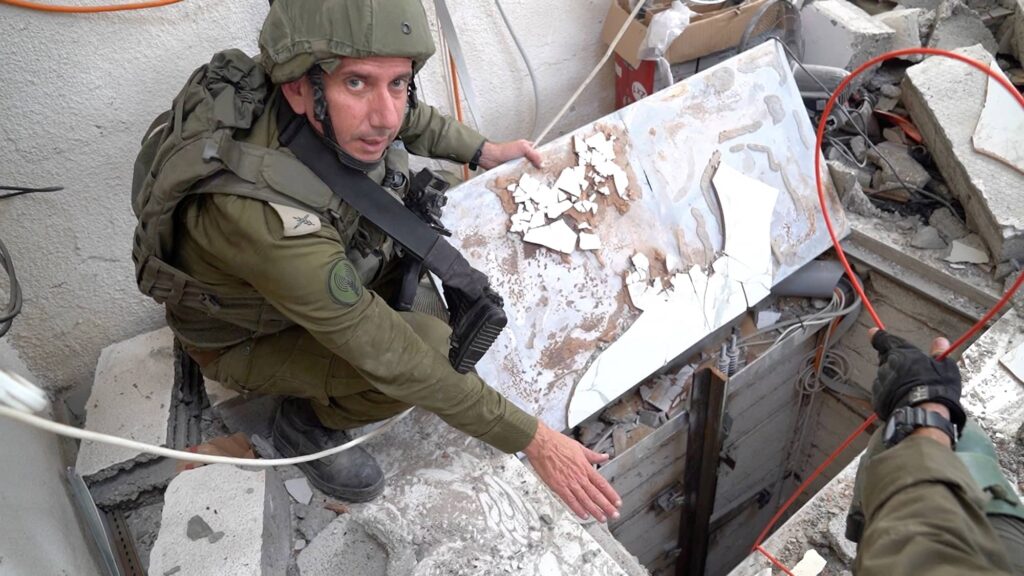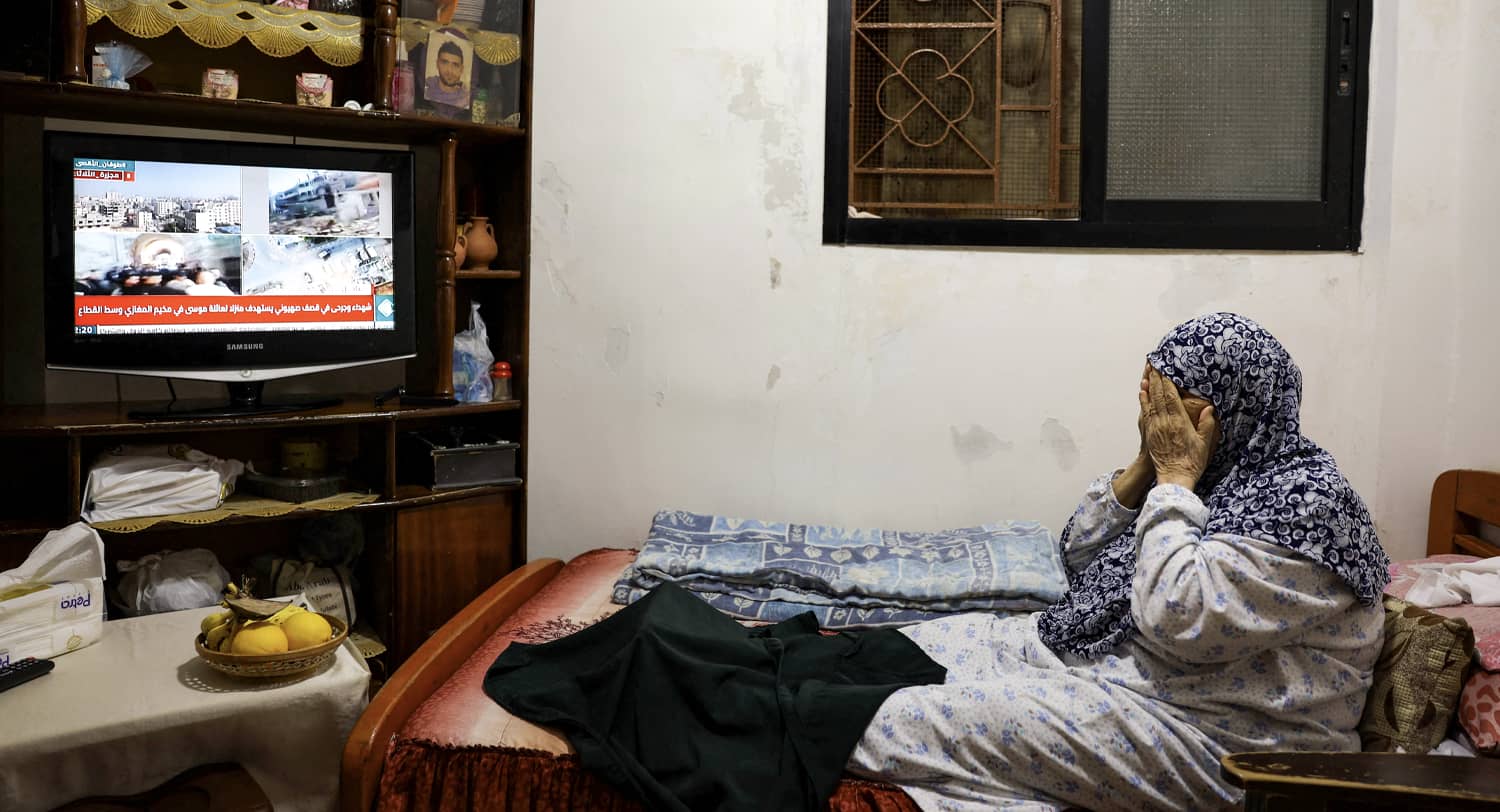The scope of the massacres committed by Hamas terrorists and Gazan civilians in southern Israel on October 7 deeply shocked Israeli society. In the aftermath of October 7 Israel was shocked a second time – by multiple denials of the massacre, the indifference to Israeli women who were raped and Israeli children who were kidnapped, and a generally hostile public opinion among young people in the West. Very soon the world was mostly busy with the war in Gaza, quickly and conveniently forgetting the origins of this war. Hamas terrorists who slit throats, beheaded victims and raped women were referred as “militants” or “paramilitary activists.” Claims made by Hamas officials were uncritically adopted and entered into the news cycle stream.
David and Goliath
One can support Israel or criticize it, or both, but Hamas’ own footage circulating online on October 7 was more than enough to indict the group. The footage showed the lifeless bodies of young women being stepped on and dragged into Gaza, bloody pants and slit ankles of another young woman, a terrified mother who held two babies in her hands, and hundreds of dead bodies of innocent party goers who were trying to escape the slaughter.
As soon as Israel began launching airstrikes, the footage from Gaza poured in, showing civilian casualties in a more graphic and detailed fashion (Israel doesn’t show mutilated bodies of its citizens out of respect to them). The question of proportionality emerged. Israel seemed unable to explain that it is not pounding Gaza to kill civilians but to eliminate the terrorist regime whose leaders promised to repeat the October 7 massacre again and again.
Israel was also fighting against a narrative of David versus Goliath. Israel was now Goliath, while the Palestinians in Hamas-controlled Gaza were David. For decades Israelis had been David, constantly threatened by their neighbors who vowed to throw it into the sea. Today Israel is a prosperous state with a strong army and wide web of relations in the Arab world. While these facts should not detract one iota from the horrors of the Hamas attack against Israeli civilians, the narrative of weak versus strong couldn’t accommodate this nuance.
Atrocities committed by Hamas, from a suicide attack in a bus to an organized mass-murder in the kibbutzim, are excused by the disparity of power and the fact that there is ongoing conflict between Israel and the Palestinians that includes military occupation of some Palestinian territories. In fact, a UN official recently made this claim.

The power of clickbait
On the night of October 17, Al-Ahli al-Arabi Hospital, which was founded and is still managed by the Episcopal Church, was bombed. Within one hour, the Hamas Ministry of Health in Gaza made a statement blaming Israel for the blast and claiming that it resulted in 500 dead Palestinians. The IDF had to investigate the event, and while every news media was already quoting Hamas, the IDF was slow to respond. After a few hours, the IDF issued a detailed explanation of the incident showing it was an Islamic Jihad rocket that had misfired and hit the hospital – but the narrative was already written in stone. An investigation of Human Rights Watch, published much later, also pointed out that “it was highly unlikely that an Israeli rocket hit the hospital”, But by then no one cared, and Hamas continues to include the casualties in the list of those who were killed in Israeli strikes.
Thorough investigations take time, yet the traditional media that competes with social media often won’t wait; it needs all the evidence presented immediately. Unfortunately speed can lead to errors. When the IDF spokesperson hastily revealed that the soldiers had discovered a calendar with the names of terrorists in Rantisi Hospital who were guarding the hostages, every Arabic speaker could immediately tell that the calendar didn’t include any names, just weekdays in Arabic. This mistake was immediately used by the media as well as bloggers as the “ultimate proof that Israel doesn’t have any evidence to support its claims regarding Hamas turning hospitals into terror bases.”
Information Wars of the 21 century
Israel has discovered that it doesn’t have enough qualified professionals who are both knowledgeable and media-savvy to convey the facts and their meaning to the general public, including in English. The IDF also does little work in Russian or other languages. It is slow to respond to journalists’ inquiries (often ignoring them altogether) and to realize that everything needs to be documented and presented without edits, because everything will be doubted and questioned. It’s not clear what happened to the money that was spent by the Israeli government on overlapping ministries for information, public affairs, combatting the Boycott, Divestment Sanctions movement. But it’s evident that Israel must do a better job in responding to media inquiries, revealing more details about the course of the war, presenting reliable evidence and debunking fakes.

Under the magnifying glass
In 2014, Matti Friedman penned a seminal article in The Atlantic titled “What the West gets wrong about Israel” where he argued that negative stories about Israel receive a disproportionate share of media attention. ”When I was a correspondent at the AP, the agency had more than 40 staffers covering Israel and the Palestinian territories. That was significantly more news staff than the AP had in China, Russia, or India, or in all of the 50 countries of sub-Saharan Africa combined. It was higher than the total number of news-gathering employees in all the countries where the uprisings of the “Arab Spring” eventually erupted. To offer a sense of scale: before the outbreak of the civil war in Syria, the permanent AP presence in that country consisted of a single regime-approved stringer. The AP’s editors believed, that is, that Syria’s importance was less than one-40th that of Israel”.
Both traditional and new media continue to operate in the same mode a decade later. Neither Sudan, where a militia is busy slaughtering Sudanese citizens by the thousands, nor Syria, where Turkey is shelling the Kurds, gets reasonable media or public attention. An ironic hashtag “no jews, no news” is often used by Israelis who are well aware of this reality.
Useful idiots in the Israeli government
It’s also important to note the role played by some Israeli government ministers in reinforcing the David versus Goliath narrative. For instance, government ministers who said that there are no civilians in Gaza and hence it’s okay to cut the water supply to the Strip (although Israel renewed its water supply to the Strip), who explained that the Palestinians should be pushed to Sinai and who vowed to renew the settlements in Gaza – they helped to enhance Israel’s image as a bully who exploits whatever the Palestinians did to take over more land and expel Palestinians.
Prime Minister Netanyahu himself focused for years not on the very real terror of Hamas, but rather on the so-called “diplomatic terror” of Mahmoud Abbas. The Palestinian Authority President actually refused to resort to violence as destructive of the Palestinian case. But Netanyahu had blurred the distinction between various Palestinian factions by crying “wolf” about the Palestinian Authority. After bashing every single Palestinian as a “terrorist,” he ensured the world stopped paying attention to the real terrorists, especially since Israel via Qatar was doing business with them until very recently.
There is certainly room for Israel to improve its media tactics, employ more professionals, allow more access to information, require its politicians to exercise more discipline. Yet, some of the reasons for Israel’s negative coverage are unrelated to efforts to explain itself better. There is long-term media bias, a made-only-for-Israel magnifying glass, instinctive support for the underdog even if the underdog is a terrorist organization, and mistrust of an Israeli government that for years tried to “divide and rule” and “manage” the Palestinians, instead of looking for a solution.
Is it a lost cause? Certainly not. Today, when Israel is threatened again by state and non-state actors in the south, in the north and in the Red Sea, it must intensify its efforts in both traditional and new media. Israel will need plenty of international support also after the murderous regime of Hamas in Gaza is dismantled.

